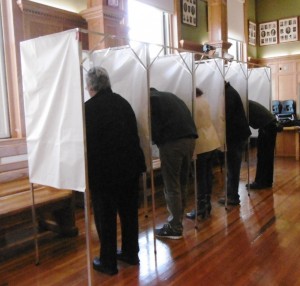WESTFIELD – While we may think that this year’s presidential election is one that’s full of venom and vitriol, there was an election early in the nation’s existence that wasn’t only worse, but may have been the worst ever in regards to campaign tactics.
The Presidential Election of 1800, just the fourth election in US history, saw two of the nation’s forefathers–John Adams and Thomas Jefferson–pitted in a battle of insults, accusations and even threats of violence. In fact, many say that at least one person’s death can be contributed to the election and its results, while another death was at least rumored.
“It was probably the most vicious campaign we ever had,” Westfield State University political science professor Dr. David Smailes said.
Smailes said that the two main candidates, Jefferson and Adams, were locked in a battle for the presidency after the two had a large political fallout. The two had split into separate political parties, with Jefferson aligning with the Democratic-Republicans and Adams siding with the Federalists.
What spurred the eventual hatred and harsh statements from each side though, was each others’ views on foreign policy.
“It was really a difference over how to deal with France,” Smailes said.
During this time, the French Revolution had just ended, uprooting the French monarchy and establishing a republic in 1799. Jefferson sided with the new French and the republican government, while Adams–who was pro-monarchial–supported the old French way and in turn, also the British.
This split in allegiance created a divide large enough and filled with enough spite that tactics became ugly.
Adams‘ camp started by slandering Jefferson with a volley of insults.
“Jefferson was said to be an atheist, a drunkard, that he was a coward because he left Virginia when the British were invading,” Smailes said. “They even spread a rumor that Jefferson died while campaigning.”
Smailes said that in addition to this, there were stories of people who were attempting to prove that Jefferson was the antichrist and that he wanted to destroy Christianity. Additionally, newspapers got into the fray, creating political cartoons and articles that lambasted Jefferson.
“There were political cartoons where Jefferson was pulling down the pillars of government with the devil, and another one where he was burning the Constitution,” Smailes said.
“I’ve seen a lot of negative stuff in this [year’s] campaigns but I don’t think anyone has charged the other with pulling down the pillars of government or that the other is working with the devil,” Smailes said.
Jefferson wasn’t the only one being portrayed in very negative ways, though.
Adams, who was the president at the time, faced a series of criticisms regarding his “secret love of monarchy” and his signing of the Alien and Sedition Acts.
The Alien and Sedition Acts were the series of acts that made it more difficult for immigrants to become citizens, allowed for deportation of non-citizens deemed dangerous or from a hostile territory and also prevented criticism of the federal government that were deemed false.
Does any of that sound familiar? Perhaps like some campaign promises?
Anyway.
Adams, in spite of saying that he was against the Alien and Sedition Acts, utilized them to wrest power from newspapers that besmirched him. One journalist in particular, James Callender, was even jailed for a period of time under the Acts after Jefferson used him and his articles to attack Adams in the print media.
All these actions though, drew criticism and ire from many people, particularly Adams’ main opponents.
“He was called a political hermaphrodite,” Smailes said of what Adams’ opponents believed. “Adams was viewed as a dictator, a monarchist, kind of a hypocrite and a fool, too.”
As the two continued to battle, who to vote for became harder and harder for people to decide. Then, on Election Day, after all the ballots were cast, Jefferson ended up with more electoral votes than Adams, and met the prerequisite 50 percent plus-one needed to become president.
While Jefferson did get enough votes to be president, Aaron Burr, who was another Democratic-Republican candidate who was running with Jefferson, received the same amount of votes as Jefferson. In short, both edged out the incumbent Adams and both received enough electoral votes to be president.
To try to explain the confusion here, in 1800 electors were able to write two names on each ballot, which meant that two men at a time received a vote. This helped to determine vice president, who was the person who received the second-most votes each election. To the forefathers, this seemed like a good idea and something that wouldn’t cause an issue–until 1800, when there was a tie.
So, in order to settle the tie, the vote went to the House of Representatives. This was a peculiar situation though, because the majority of the House were Federalists that were outgoing officials, and the two candidates were incoming Democrat-Republicans.
From Feb. 11 to Feb. 17, House members continued to cast ballot after ballot, not reaching majority needed for either candidate. After the votes kept coming up short, Alexander Hamilton–who was the Federalists’ unofficial leader at the time–convinced the Federalists in the House to cast their votes for Jefferson.
“With a lot of political maneuvering Jefferson was made president,” Smailes said. “Alexander Hamilton lobbied the federalists–the opposition party who he was a member of–saying, ‘Look, Jefferson is bad, but Burr is worse. He’s an unprincipled person,’ and got them to back Jefferson rather than Burr.”
And so, on the 36th ballot casting, Jefferson beat Burr and became president.
Aftermath
This action incensed Burr. He became cold toward Jefferson–which made everything even more awkward since at the time the runner-up became vice president–and resulted in Burr holding a grudge against Hamilton.
This continued for many years, as both Hamilton and Burr were New York politicians and continued to butt heads in the state, eventually culminating in the 1804 New York gubernatorial race between the two. Hamilton, during the race, ran an inflammatory piece in a local newspaper about Burr, attacking him.
Burr couldn’t let this attack go, and considering that he blamed Hamilton for himself not becoming president and for being dropped off the presidential ticket by Jefferson earlier in 1804, Burr felt that the only way to rectify the grudge was by challenging Hamilton to a duel.
Hamilton accepted.
On July 11, 1804, the two crossed over to New Jersey–due to New York’s laws against duels–and, each armed with a pistol, stood across from each other, with spectators looking on.
Smailes said that it is uncertain who fired first, but it was reported anecdotally that Hamilton and Burr were both able to get a shot off. However, Hamilton reportedly missed and struck a nearby tree, while Burr hit Hamilton in the abdomen.
Hamilton would succumb to his wound a day later.
And while Burr survived the duel, his life would never be the same.
“For a time Burr had a murder charge against him,” Smailes said. “They eventually dropped all the charges against him, it was the end of his career really.”
So, while this election may seem like a tough one for many, just remember that it could always be worse.




